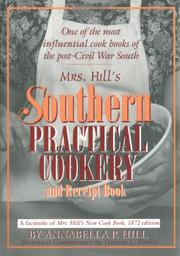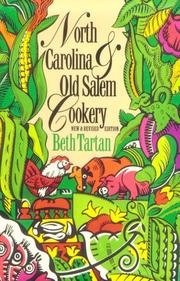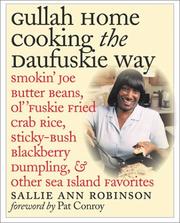Book
ISBN: 1609174542 9781609174545 Year: 2015 Publisher: East Lansing, MI Michigan State University Press
Abstract | Keywords | Export | Availability | Bookmark
 Loading...
Loading...Choose an application
- Reference Manager
- EndNote
- RefWorks (Direct export to RefWorks)
Cooking, American --- Cooking --- Southern style --- History --- 1800-1899 --- Southern States.
Book
ISBN: 9798890852939 1469641453 1469638568 Year: 2018 Publisher: Chapel Hill : The University of North Carolina Press,
Abstract | Keywords | Export | Availability | Bookmark
 Loading...
Loading...Choose an application
- Reference Manager
- EndNote
- RefWorks (Direct export to RefWorks)
"Edna Lewis (1916-2006) wrote some of America's most resonant, evocative, and significant cookbooks ever, including the now classic The Taste of Country Cooking. Lewis cooked and wrote first as a means to explore her memories of childhood on a farm in Freetown, Virginia, a community originally founded by freed black families. Later, she wrote to commemorate and document the seasonal richness of southern foodways ... She moved from the rural South to New York City, where she became a chef and a political activist, and eventually returned to the South. Her reputation as a trailblazer in the revival of regional cooking and as a progenitor of the farm-to-table movement only continues to burgeon."--
Cooking, American --- Cookbooks --- African American cooks. --- Southern style. --- History and criticism. --- Lewis, Edna.

ISBN: 0585359008 9780585359007 1570030480 Year: 1995 Publisher: Columbia, S.C. University of South Carolina Press
Abstract | Keywords | Export | Availability | Bookmark
 Loading...
Loading...Choose an application
- Reference Manager
- EndNote
- RefWorks (Direct export to RefWorks)
Cooking, American --- Recreation & Sports --- Social Sciences --- Confederate cooking --- Cooking, Confederate --- Cooking, Southern (United States) --- Southern cooking (United States) --- Southern style. --- Southern style --- Confederate style --- Confederate States of America --- Social life and customs.
Book
ISBN: 1280491639 9786613586865 0820343579 9780820343570 0820326305 9780820326306 Year: 2004 Publisher: Athens, GA University of Georgia Press
Abstract | Keywords | Export | Availability | Bookmark
 Loading...
Loading...Choose an application
- Reference Manager
- EndNote
- RefWorks (Direct export to RefWorks)
A wonderfully wide-ranging selection of Southern recipes remarkable for their ease of preparation and perfectly tuned to the pace of our lives today. Whether you're cooking for guests or the folks at home, planning a backyard barbecue or a big gala party, you'll find here an abundant supply of irresistible dishes.
Cooking, American --- Confederate cooking --- Cooking, Confederate --- Cooking, Southern (United States) --- Southern cooking (United States) --- Southern style. --- Confederate style
Book
ISBN: 1610756401 9781610756402 9781682260647 Year: 2018 Publisher: Fayetteville
Abstract | Keywords | Export | Availability | Bookmark
 Loading...
Loading...Choose an application
- Reference Manager
- EndNote
- RefWorks (Direct export to RefWorks)
Cooking, American --- Food writers --- Cookbooks --- Food writing --- Southern style --- Social aspects. --- Social aspects --- History. --- Southern States --- Social life and customs.
Book
ISBN: 1283267926 9786613267924 0820341878 Year: 2011 Publisher: Athens : University of Georgia Press,
Abstract | Keywords | Export | Availability | Bookmark
 Loading...
Loading...Choose an application
- Reference Manager
- EndNote
- RefWorks (Direct export to RefWorks)
Combining the study of food culture with gender studies and using perƯspectives from historical, literary, environmental, and American studies, Elizabeth S.D. Engelhardt examines what southern women's choices about food tell us about race, class, gender, and social power. Shaken by the legacies of Reconstruction and the turmoil of the Jim Crow era, different races and classes came together in the kitchen, often as servants and mistresses but also as people with shared tastes and traditions. Generally focused on elite whites or poor blacks, southern foodways are often portrayed as stable and unchanging-even as an untroubled source of nostalgia. A Mess of Greens offers a different perspective, taking into account industrialization, environmental degradation, and women's increased role in the work force, all of which caused massive economic and social changes. Engelhardt reveals a broad middle of southerners that included poor whites, farm families, and middle- and working-class African Americans, for whom the stakes of what counted as southern food were very high. Five "moments" in the story of southern food-moonshine, biscuits versus cornbread, girls' tomato clubs, pellagra as depicted in mill literature, and cookbooks as means of communication-have been chosen to illuminate the connectedness of food, gender, and place. Incorporating community cookbooks, letters, diaries, and other archival materials, A Mess of Greens shows that choosing to serve cold biscuits instead of hot cornbread could affect a family's reputation for being hygienic, moral, educated, and even godly
Food habits --- Food --- Cooking, American --- Women --- History. --- Social aspects --- Southern style --- Social life and customs. --- Southern States --- Social conditions.
Book
ISBN: 9798890855749 146966836X 9781469668499 1469668491 9781469668376 1469668378 9781469668369 Year: 2022 Publisher: Chapel Hill
Abstract | Keywords | Export | Availability | Bookmark
 Loading...
Loading...Choose an application
- Reference Manager
- EndNote
- RefWorks (Direct export to RefWorks)
Like everything about the American South, southern baking is far more complicated than it seems. Rebecca Sharpless here weaves a chronicle, vast in perspective and entertaining in detail, revealing how three global food traditions merged to create what we know as the southern baking tradition.
Baking --- Cooking, American --- Food habits --- Cultural fusion --- History. --- Southern style. --- Social aspects --- Southern States --- Social life and customs

ISBN: 0807867071 9780807867075 0807820350 080784375X 9798890867070 Year: 2006 Publisher: Chapel Hill : The University of North Carolina Press,
Abstract | Keywords | Export | Availability | Bookmark
 Loading...
Loading...Choose an application
- Reference Manager
- EndNote
- RefWorks (Direct export to RefWorks)
North Carolina and Old Salem Cookery
Cooking, American --- Cooking --- Social Sciences --- Recreation & Sports --- Cookery --- Cuisine --- Food preparation --- Food science --- Home economics --- Cookbooks --- Dinners and dining --- Food --- Gastronomy --- Table --- American cooking --- Cookery, American --- Southern style

ISBN: 1469616513 0807889628 9780807889626 9781469616513 0807827835 9780807827833 0807854565 9780807854563 9798893131499 Year: 2003 Publisher: Chapel Hill
Abstract | Keywords | Export | Availability | Bookmark
 Loading...
Loading...Choose an application
- Reference Manager
- EndNote
- RefWorks (Direct export to RefWorks)
""If there's one thing we learned coming up on Daufuskie,"" remembers Sallie Ann Robinson, ""it's the importance of good, home-cooked food."" In this enchanting book, Robinson presents the delicious, robust dishes of her native Sea Islands and offers readers a taste of the unique, West African-influenced Gullah culture still found there. Living on a South Carolina island accessible only by boat, Daufuskie folk have traditionally relied on the bounty of fresh ingredients found on the land and in the waters that surround them. The one hundred home-style dishes presented here include salads an
Cooking, American --- Gullah cooking. --- Gullah cookery --- Cooking --- Confederate cooking --- Cooking, Confederate --- Cooking, Southern (United States) --- Southern cooking (United States) --- Southern style. --- Confederate style
Book
Abstract | Keywords | Export | Availability | Bookmark
 Loading...
Loading...Choose an application
- Reference Manager
- EndNote
- RefWorks (Direct export to RefWorks)
"Selected papers from the Annual Meeting of the Southern Anthropological Society, Oxford, Mississippi, February, 2007."
Cooking, American --- Food --- Food habits --- Food Handling. --- Cooking --- American--Southern style--Social aspects--Congresses --- Food--Social aspects--Southern States--Congresses --- Southern States--Social life and customs --- Social aspects --- Congresses. Southern Anthropological Society --- Congresses. --- Congresses. --- Cooking --- American--Southern style--Social aspects--Congresses --- Food--Social aspects--Southern States--Congresses --- Southern States--Social life and customs

 Search
Search Feedback
Feedback About UniCat
About UniCat  Help
Help News
News